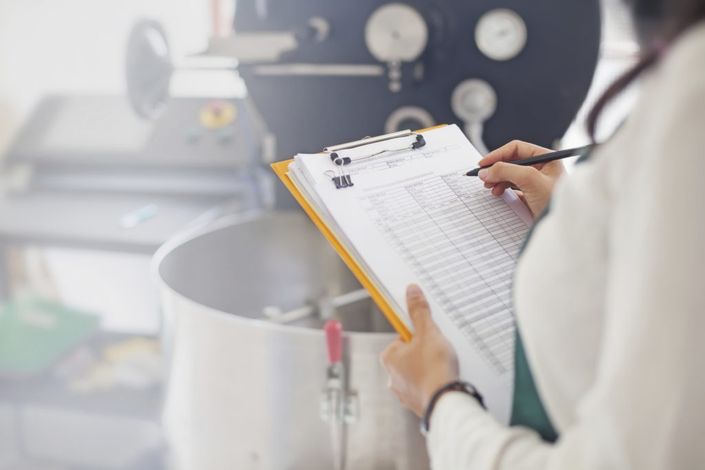Statistical Process Control Training Course Description
This course provides an in-depth understanding of Statistical Process Control (SPC), a key methodology used in quality management to monitor, control, and improve process performance.
This 6-hour virtual seminar includes a presentation of the steps and techniques used to quantify variability in manufacturing processes, and to assure quality products.
All processes exhibit intrinsic variation. However, sometimes the variation is excessive, and this hinders the ability to achieve reliable measurements and desired results. Statistical process control (SPC) and statistical quality control (SQC) allow us to control the functions of our processes (input) and the quality of our product (output) by providing tangible tools for monitoring and testing.
The concepts and information presented will be mainly concerned with statistical process control: obtaining monitoring information (data) that is objective, unbiased, and useful for decision making.
Process and quality control are important for a company’s reputation. A good system of processing and quality checks reduce costs associated with production waste and re-work due to defects, and allows a company to deliver products that are high in quality. Many industries are also required to have a good quality management system in place to achieve compliance with regulatory authorities.
The objective of the seminar is to provide information that can be used immediately by personnel involved in production operations, and by supervisors and management in decision making. Although the presentation involves use of statistical techniques, presentation of statistical theory will be limited to only what is needed by the attendees to understand and implement processes and monitoring tools within the statistical framework.
Presented examples will include an emphasis on the manufacturing processes and quality assurance needs of product in the medical device and pharmaceutical industries.
Process and quality control are constantly evolving. Therefore, historical concepts, current trends and regulatory requirements will be discussed. The presentation of statistical charts and analyses, graphical techniques for planning, trouble-shooting and problem solving will also be presented.
Minitab statistical software will be used to demonstrate data collection and input, and how to build and interpret various process control charts for both attributes and variables data. The seminar will also include the use of Minitab to develop attributes and variables sampling plans for quality assurance and acceptance. A handout and dataset will be provided to attendees so they may work hands-on with the information presented in the seminar.
Reasons for You to Attend Statistical Process Control Training Session
All processes exhibit intrinsic variation. However, sometimes the variation is excessive, and this hinders the ability to achieve reliable measurements and desired results. Statistical process control (SPC) allows us to control the functions of our processes (input) by providing tangible monitoring tools.
Process control is important for a company’s reputation. A good system of processing and checks reduces costs associated with production waste and re-work due to defects and allows a company to deliver products that are high in quality. Many industries are also required to have a good process management system in place to achieve compliance with regulatory authorities.
This seminar will provide attendees with the statistical tools necessary to monitor processes to ensure the quality of manufactured products. Ms. Eisenbeisz will make use of Minitab software in her presentation.
Agenda
It’s a System! Elements of Quality Management
- Deming 14 points for total quality management
- Dr. Ishikawa, seven quality control tools (7-QC) and supplementals (7-SUPP)
- Pareto principle (80/20 rule)
- Shewhart (Plan, Do, Study, Act)
Regulatory Requirements in Quality Management
- FDA Quality System Regulation (QSR)
- ISO 13485:2016
- IS 9001:2015
- Harmonization of regulations with FDA guidance/regulations
Statistical basics
- Descriptive and Graphical Techniques
- Normal Distribution
- Histograms
- Scatterplots
- Pareto charts
- Cause and effect (fishbone) diagrams
- Defect concentration diagrams
Statistical Process Control: The ABC’s of Control Charts
- Elements of a control chart
- Control Charts for Discrete Data
- c chart
- u chart
- p chart
- np chart
- Control Charts for Continuous Data
- X-bar chart
- R chart
- I chart
- MR chart
- Combined charts (Xbar-R, I-MR)
- More Control Charts
- Classical Shewhart control charts
- Cumulative Sum (CUSUM) charts
- Exponentially Weighted Moving Average (EWMA) charts
- Hotelling (multivariate) control charts
Who Bill Benefit
- Quality assurance (QA) engineers
- Quality control (QC) engineers
- R&D engineers
- Process control personnel
- Manufacturing/Industrial personnel
- Manufacturing/Industrial personnel
- Production supervisors
- Management personnel of processing facilities
What's Included for Each Registered Attendee:
- Downloadable Presentation Slides: Access a copy of the seminar slides for your reference and further study.
- Certificate of Participation: A certificate to validate your training and enhance your professional records.
- Q/A Session: Engage in an interactive Q&A session to get your questions answered and clarify key concepts.
- Free Handouts: Receive valuable handouts on Statistical Process Control (SPC) to support your learning and implementation.
How to Attend:
All WCS Seminar live training programs audio and visuals are delivered via Go to Webinar with a basic system requirement of a computer with internet access. You do not require a Go to Webinar account to join WCS Seminar’ live training courses, participants receive an email invitation that provides the access you need to join the meeting.
Frequently Asked Questions (FAQ)
1. Who should take this course?
Anyone looking to improve process quality and efficiency—ideal for quality professionals, engineers, managers, and data analysts.
2. Do I need prior experience in SPC or statistics?
No, this course is designed for beginners. We’ll guide you through the basics and build up to more advanced techniques.
3. How long will it take to complete the course?
The course is available both Live and Recorded format. Duration 6 hrs.
4. Will I receive a certificate?
Yes! You’ll get a certificate of completion that highlights your expertise in SPC.
5. How will this course benefit my career?
You’ll gain practical skills to optimize processes, reduce waste, and improve quality—boosting your career prospects and making you more valuable to employers.
6. Is this course applicable to industries outside of manufacturing?
Yes! SPC can be applied to any process-driven industry, including healthcare, finance, and logistics.
What Attendees Are Saying:
"A Game-Changer for Our Process Improvement Efforts!"
"This SPC course provided us with the tools we needed to improve our quality control processes. The practical approach and hands-on training allowed us to immediately apply what we learned. Our team is already seeing the benefits of reduced variability and increased efficiency!"
— Quality Manager
"Clear, Engaging, and Extremely Valuable!"
"The instructor made complex SPC concepts easy to understand and apply. I’ve gained valuable insights that I can now use to enhance our process control systems. The certificate of participation is a great bonus for my professional development."
— Operations Supervisor

Elaine Eisenbeisz
Statistician ( 30 + yrs exp.)
Owner & Principal of Omega Statistics
Murrieta, California, United States
Elaine Eisenbeisz is a private practice statistician and owner of Omega Statistics, a statistical consulting firm based in Southern California. Elaine has over 30 years of experience in creating data and information solutions for industries ranging from governmental agencies and corporations, to start-up companies and individual researchers.
Elaine’s love of numbers began in elementary school where she placed in regional and statewide mathematics competitions. She attended University of California, Riverside, as a National Science Foundation scholar, where she earned a B.S. in Statistics with a minor in Quantitative Management, Accounting. Elaine received her Master’s Certification in Applied Statistcs from Texas A&M, and is currently finishing her graduate studies at Rochester Institute of Technology.




